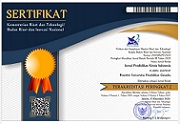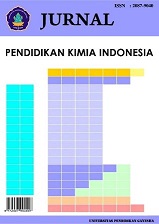How Are The Science Process Skills of Prospective Science Teacher Students: Studies in Inorganic Chemistry and Gender
DOI:
https://doi.org/10.23887/jpki.v8i2.76318Keywords:
KPS, Discovery Learning, GenderAbstract
Prospective teacher students must be able to design practicums so that the learning process is meaningful. The skills that students develop in carrying out scientific discoveries, namely applying concepts, rules, and characteristics that exist in science, are called science process skills (SPS). Therefore, in building students' knowledge, students must have process skills in teaching so they can teach effectively and must have a good understanding of concepts and strong process skills. This research aims to describe the SPS of prospective science education teacher students through inorganic chemistry courses after going through learning with the discovery learning model. This research uses a quantitative approach with a pre-experimental design one-shot case study research method. The research results show that student SPS as a whole is in the high category with an average percentage of 59.71%. SPS analysis in classes A, B, and C, respectively, has an average percentage of 58.23%, 62.66%, and 58.24% in the high category. SPS analysis based on gender shows that the respective percentage of male students is 53.89% with the medium category for women and 59.81% for the high category.
References
Afrizon, R., Ratnawulan, & Fauzi, A. (2012). Peningkatan Perilaku Berkarakter dan Keterampilan Berpikir Kritis Siswa Kelas IX MTSN Model Padang Pada Mata Pelajaran IPA-Fisika Menggunakan Model Problem Based Instruction. Jurnal Penelitian Pembelajaran Fisika, 1(2012), 1–16.
Agustini, R. (2021). Journal of Technology and Science Education Students Through Self-Project Based LearninG ( SjBL ) In. 11(January 2020), 371–387.
Anisah, S., Subiki, S., & Supriadi, B. (2018). Analisis Keterampilan Proses Sains Siswa SMA Pada Materi Kinematika Gerak Lurus. Jurnal Edukasi, 5(1), 5. https://doi.org/10.19184/jukasi.v5i1.7582
Cahya, N. N., Saridewi, N., & Muslim, B. (2023). Analisis Keterampilan Proses Sains Mahasiswa Kimia Uin Syarif Hidayatullah Jakarta Pada Praktikum Kimia Anorganik Dari Rumah. Dalton : Jurnal Pendidikan Kimia Dan Ilmu Kimia, 6(2), 127. https://doi.org/10.31602/dl.v6i2.10734
Chabalengula, V. M., Mumba, F., & Mbewe, S. (2012). How pre-service teachers’ understand and perform science process skills. Eurasia Journal of Mathematics, Science and Technology Education, 8(3), 167–176. https://doi.org/10.12973/eurasia.2012.832a
Changwong, K., Sukkamart, A., & Sisan, B. (2018). Critical thinking skill development: Analysis of a new learning management model for Thai high schools. Journal of International Studies, 11(2), 37–48. https://doi.org/10.14254/2071-8330.2018/11-2/3
Dami, Z. A., & Purwanto, F. (2020). The Effect of Religiosity on Organizational Citizenship Behaviour with Gender , Age , and Working Period as Moderators Variable. 13(4), 231–246.
Danianty, N., & Sari, P. M. (2022). Hubungan Literasi Sains dengan Keterampilan Proses Sains pada Peserta Didik Kelas V di Sekolah Dasar. Ideas: Jurnal Pendidikan, Sosial, Dan Budaya, 8(3), 1007. https://doi.org/10.32884/ideas.v8i3.894
Darmaji, D., Kurniawan, D. A., & Irdianti, I. (2019). Physics education students’ science process skills. International Journal of Evaluation and Research in Education , 8(2), 293–298. https://doi.org/10.11591/ijere.v8i2.16401
Effendi, E., Rosa Sinensis, A., Widayanti, W., & Firdaus, T. (2021). Keterampilan Proses Sains Mahasiswa Pendidikan Fisika STKIP Nurul Huda pada Mata Kuliah Optika. JIPFRI (Jurnal Inovasi Pendidikan Fisika Dan Riset Ilmiah), 5(1), 21–26. https://doi.org/10.30599/jipfri.v5i1.1000
Gasila, Y., Fadillah, S., & Wahyudi. (2019). Analisis Keterampilan Proses Sains Siswa dalam Menyelesaikan Soal IPA di SMP Negeri Kota Pontianak. Jurnal Inovasi Dan Pembelajaran Fisika, 06(1), 14–22.
Herawati, W. (2021). Peningkatan Keterampilan Proses Melalui Penerapan Model Pembelajaran Penemuan (Discovery Learning) Pada Siswa Kelas XI MIPA-3. Journal of Classroom Action Research, 3(2). https://doi.org/10.29303/jcar.v3i2.894
Hidayah, F. F., & Imaduddin, M. (2015). Diskripsi Keterampilan Proses Sains Calon Guru Kimia Berbasis Inquiry Pada Praktikum Kimia Dasar. Jurnal Pendidikan Sains Universitas Muhammadiyah Semarang, 03(01), 8–12.
Hulyadi. (2021). Profil Keterampilan Proses Sains Mahasiswa Melalui Praktikum Kimia Organik I. Reflection Journal, 1(2), 77–81. https://doi.org/10.36312/rj.v1i2.653
Mellyzar, M., Rahmi, A., & Fitriani, H. (2023). Science Process Skills of Pre-service Teacher Through Inorganic Chemistry Practicum Activities. Atlantis Press SARL. https://doi.org/10.2991/978-2-38476-012-1_23
Misbah, M., Wati, M., Rif’at, M. F., & Prastika, M. D. (2018). Pengembangan Petunjuk Praktikum Fisika Dasar I Berbasis 5M Untuk Melatih Keterampilan Proses Sains dan Karakter Wasaka. Jurnal Fisika FLUX, 15(1), 26. https://doi.org/10.20527/flux.v15i1.4480
Murni, M. (2018). Profile of student's science process skills and learning design to practice it. Periodic Scientific Physical Education, 6 (1),118-129.
Nwagbo, C. & Chukelu, U. C. (2011). Effects of biology practical activities on students’ process skill acquisition. Journal of the Science Association of Nigeria (JSTAN), 46(1) 58-70.
Özgelen, S. (2012). Students’ science process skills within a cognitive domain framework. Eurasia Journal of Mathematics, Science and Technology Education, 8(4), 283–292. https://doi.org/10.12973/eurasia.2012.846a
Putri, R. Y., Sudarti, S., & Prihandono, T. (2022). Analisis Keterampilan Proses Sains Siswa dalam Pembelajaran Rangkaian Seri Paralel Menggunakan Metode Praktikum. Edumaspul: Jurnal Pendidikan, 6(1), 497–502. https://doi.org/10.33487/edumaspul.v6i1.3145
Rahmadanty, F., & Wasis. (2020). Analisis Keterampilan Proses Sains Siswa SMA/MA dan Kaitannya dengan Pemahaman Konsep Getaran Harmonik. Inovasi Pendidikan Fisika, 09(03), 428–438.
Rampean, B. A. O., Rohaeti, E., & Utami, W. P. (2022). Teacher Difficulties for Develop Higher Order Thinking Skills Assessment Instrument on Reaction Rate. Jurnal Pendidikan Kimia Indonesia, 6(1), 11–19. https://doi.org/10.23887/jpk.v6i1.40898
Salosso, S. W., Nurlaili, & Kusumawardani, R. (2018). Analisis keterampilan proses sains siswa SMA melalui penerapan model pembelajaran learning cycle 5E pada pokok bahasan larutan asam dan basa. Bivalen: Chemical Studies Journal, 1(1), 45–50. https://doi.org/10.30872/bcsj.v1i1.280
Setiawan, A. M., & Sugiyanto. (2020). Science process skills analysis of science teacher on professional teacher program in Indonesia. Jurnal Pendidikan IPA Indonesia, 9(2), 241–247. https://doi.org/10.15294/jpii.v9i2.23817
Shahali, E. H. M., Halim, L., Treagust, D. F., Won, M., & Chandrasegaran, A. L. (2017). Primary School Teachers’ Understanding of Science Process Skills in Relation to their Teaching Qualifications and Teaching Experience. Research in Science Education, 47, 1–22. https://doi.org/10.1007/s11165-015-9500-z
Sinaga, S. (2020). Penerapan Model Pembelajaran Discovery Learning untuk Meningkatkan Keterampilan Proses Sains dan Hasil Belajar Biologi Siswa Kelas Viii-6 SMP Negeri 1 Tebing Tinggi. School Education Journal, 10(4), 379–388.
Sugiyono. (2016). Methods of quantitative, qualitative and R & D research, Bandung: ALFABETA.
Supriyanto, J. (2019). Penggunaan Model Discovery Learing Pada Pembelajaran Konsep Gaya dan Penerapannya untuk Meningkatkan Keterampilan Proses Sains Siswa Kelas VII SMP Negeri 2 Batang Alai Utara. Sagacious Jurnal Ilmiah Pendidikan Dan Sosial, 5(2), 35–42.
Syamsiah, S., Anas, M., & Sukariasih, L. (2020). Penerapan Model Discovery Learning untuk Meningkatkan Keterampilan Proses Sains dan Hasil Belajar IPA Ranah Pengetahuan Peserta Didik Kelas VIII1 SMP Negeri 05 Poleang Timur pada Materi Pokok Cahaya dan Alat Optik. Jurnal Penelitian Pendidikan Fisika, 4(3), 108. https://doi.org/10.36709/jipfi.v4i3.14199
Tilakaratne, C. T. K., & Ekanayake, T. M. S. S. K. Y. (2017). Achievement level of Science Process Skills of Junior Secondary Students: Based on a Sample of Grade Six and Seven Students from Sri Lanka. International Journal of Environmental Science and Technology, 12(2), 2089–2108. https://www.researchgate.net/publication/331302293
Widdina, S., Rochintaniawati, D., & Rusyati, L. (2018). The Profile of Students’ Science Process Skill in Learning Human Muscle Tissue Experiment at Secondary School. Journal of Science Learning, 1(2), 53. https://doi.org/10.17509/jsl.v1i2.10146
Wola, B. R., Rungkat, J. A., & Harindah, G. M. D. (2023). Science process skills of prospective science teachers’ in practicum activity at the laboratory. Jurnal Inovasi Pendidikan IPA, 9(1), 50–61. https://doi.org/10.21831/jipi.v9i1.52974
Yuliati, C. L., & Susianna, N. (2023). Penerapan Model Pembelajaran Discovery Learning Dalam Meningkatkan Keterampilan Proses Sains, Berpikir Kritis, dan Percaya Diri Siswa. Scholaria: Jurnal Pendidikan Dan Kebudayaan, 13(1), 48–58. https://doi.org/10.24246/j.js.2023.v13.i1.p48-58
Downloads
Published
How to Cite
Issue
Section
License
Copyright (c) 2024 Ramlawati

This work is licensed under a Creative Commons Attribution-ShareAlike 4.0 International License.
Authors who publish with the Jurnal Pendidikan Kimia Indonesia agree to the following terms:
- Authors retain copyright and grant the journal the right of first publication with the work simultaneously licensed under a Creative Commons Attribution License (CC BY-SA 4.0) that allows others to share the work with an acknowledgment of the work's authorship and initial publication in this journal.
- Authors are able to enter into separate, additional contractual arrangements for the non-exclusive distribution of the journal's published version of the work (e.g., post it to an institutional repository or publish it in a book), with an acknowledgment of its initial publication in this journal.
- Authors are permitted and encouraged to post their work online (e.g., in institutional repositories or on their website) prior to and during the submission process, as it can lead to productive exchanges, as well as earlier and greater citation of published work. (See The Effect of Open Access)





